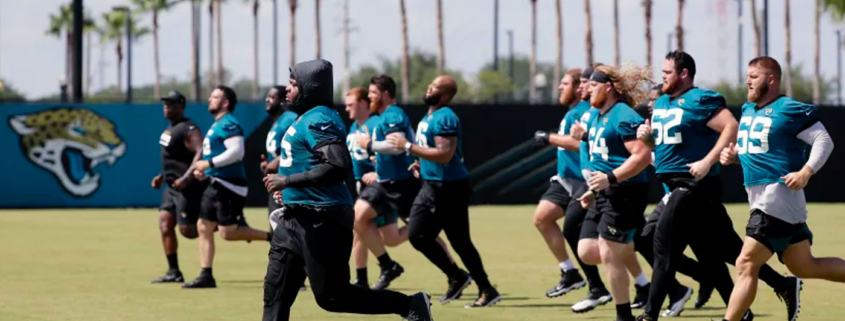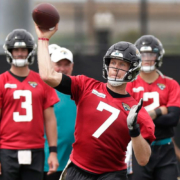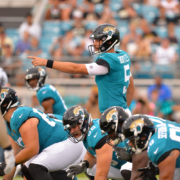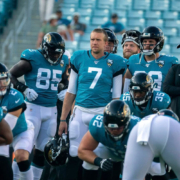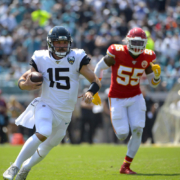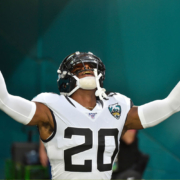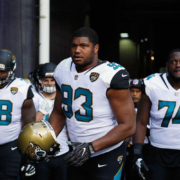Would You Play?
Sitting down at lunch this week, a friend of mine posed a hypothetical situation.
“The Jaguars need a quarterback and despite the fact that you’re on the wrong side of fifty, they think you’re the answer,” he said. “They’re offering you a $2M contract. The caveat is you might catch the virus. Will you sign?”
“That’s a big stretch,” I said with a laugh, “But yes, I’d sign.”
Over the course of the next hour we talked about the risk involved to the people around me, the risk to my health and who I’d have to give up seeing, specifically my parents who are in their mid 80’s.
It was a lot to think about, but in the end I still decided I would play.
Why?
My age puts me in what they’re calling the “vulnerable demographic” but other than that, I don’t know of any other underlying conditions that would accelerate my risk. It’s not all about the money either, but that was a factor, equal to how I remember how much I liked playing football.
“Put that equation in a 23-year old, established professional football player’s mind, and it’s easy to see why they’re playing,” he concluded.
“In the past six months there’s been a big learning curve about this virus,” Dr. Brian Turrisi, a retired pulmonologist from Georgetown and George Washington University Hospitals said recently “The vast majority of people very sick or dying are over 50 and the larger group is over 70. Pro sports are played by people younger than forty. When we confine this to young people who play professional sports, they’re the healthiest of all,”
All professional leagues have had players opt out of this season, most citing family concerns.
Several Jaguars players confirmed they considered sitting out but weighed the options and decided to play.
“I definitely thought about it because I do have two younger daughters,” defensive back D.J. Hayden said. “I felt like this year is a big year for me. I did not want to sit the season out. But I think the best thing for my family is for me to play this year.”
“I would be lying to you if I said I didn’t,” second year defensive end Josh Allen revealed when asked if he thought about opting out. “Family is first. I don’t want to put my family in jeopardy of any harm that I bring to them. That was always something that I kept close to me. Kate, my wife, she really encouraged me to keep playing football this year because she knows what I’m striving for in my career.”
With no traditional “training camp” situation, the Jaguars players are coming to the stadium each day, and then going home. The potential for exposure increases exponentially outside of their work environment, meaning the players have to put a lot of trust in their teammates to follow the protocols when they’re not at work.
“Yeah, no doubt,” Jaguars Quarterback Gardner Minshew explained. “I told all of the guys that we have a responsibility to each other and each other’s families to be safe. Sometimes it’s not fun and sometimes it’s not what you want to do, but it’s what we need to do.”
Besides organizing practices, evaluating talent and installing the playbook, one of Jaguars Head Coach Doug Marrone’s jobs is to keep the conversation going about Covid-19, Marrone is hammering home the trust teammates are putting into one another each day. He recounted a story he told the players about getting ready to walk out of the door of the coaches’ offices without his mask on.
“So I immediately put my shirt up, turn back and go put it on,” he said. “And I was telling those guys, ‘Hey listen, we’ve got to help each other, we’ve got to be responsible.’ I said things like this will happen, and I would appreciate it if I would’ve gone into the hallway and walked down, if someone would’ve seen me, I would’ve hoped they’d say something like, ‘Hey coach!”
There’s been some talk about putting NFL teams in a “home bubble” once they cut down to the 53 players on the regular season roster. That means everybody coming in contact with the players over sixteen weeks and through the playoffs would stay together and be shut off from the rest of the world.
That’s a tough ask, even for the outsized money professional football players make. But what about the coaching staffs? The support staffs? Would the team doctors, Dr. Kevin Kaplan and Dr. Anthony Iselborn be willing to give up their practices for four months? Probably not.
“It’s very difficult to do for a long period of time,” Marrone said of the bubble idea this week. “I think that for us, I just think it’s a level of responsibility until they tell [us] anything else. You know, if someone did come to us and said, ‘Hey listen, I don’t feel that I’m in a safe environment when I leave this building,’ we would be very proactive in doing whatever we can to make sure that that player feels safe and we put him in an environment where he can feel that way.”
Marrone said the protocols in the stadium regarding everything Covid-19 related make him feel very safe and secure.
Despite the Jaguars having more players than any other team on the league’s new Covid-19/Reserve list, the NFL’s rate of positive tests for the virus is less than one percent. Zero point eight-four to be exact. A player doesn’t have to test positive to be put on the list.
Minshew revealed he was on the list and missed a couple of days with the team because he was around another player who did test positive. He and teammates Andrew Wingard and Michael Walker were roommates until they decided the best course of action to combat the virus at home was to live alone.
“They’ve moved out this year, but I think everybody in the league just can’t afford to be around somebody,” Minshew said. “Even if you’re not going to contract it, you can’t afford sitting out those couple days. We are all just going to ride it out solo this year. But, that’s honestly a good thing that it happened now. It was a thing that we all agreed that was best for us.”
Minshew said it was like the first day of school when he rejoined the team, even having his outfit picked out for his return. He doesn’t want to go through that again and has adopted a “just get to work” leadership attitude when it comes to the virus.
“If I am here in the building, it’s all I can do, until they tell me I have to leave, and I’m going to give it all I have here,” he said. “And if I can’t be in here, then I am going to figure out how I can get better at home and how I can participate from home.”

